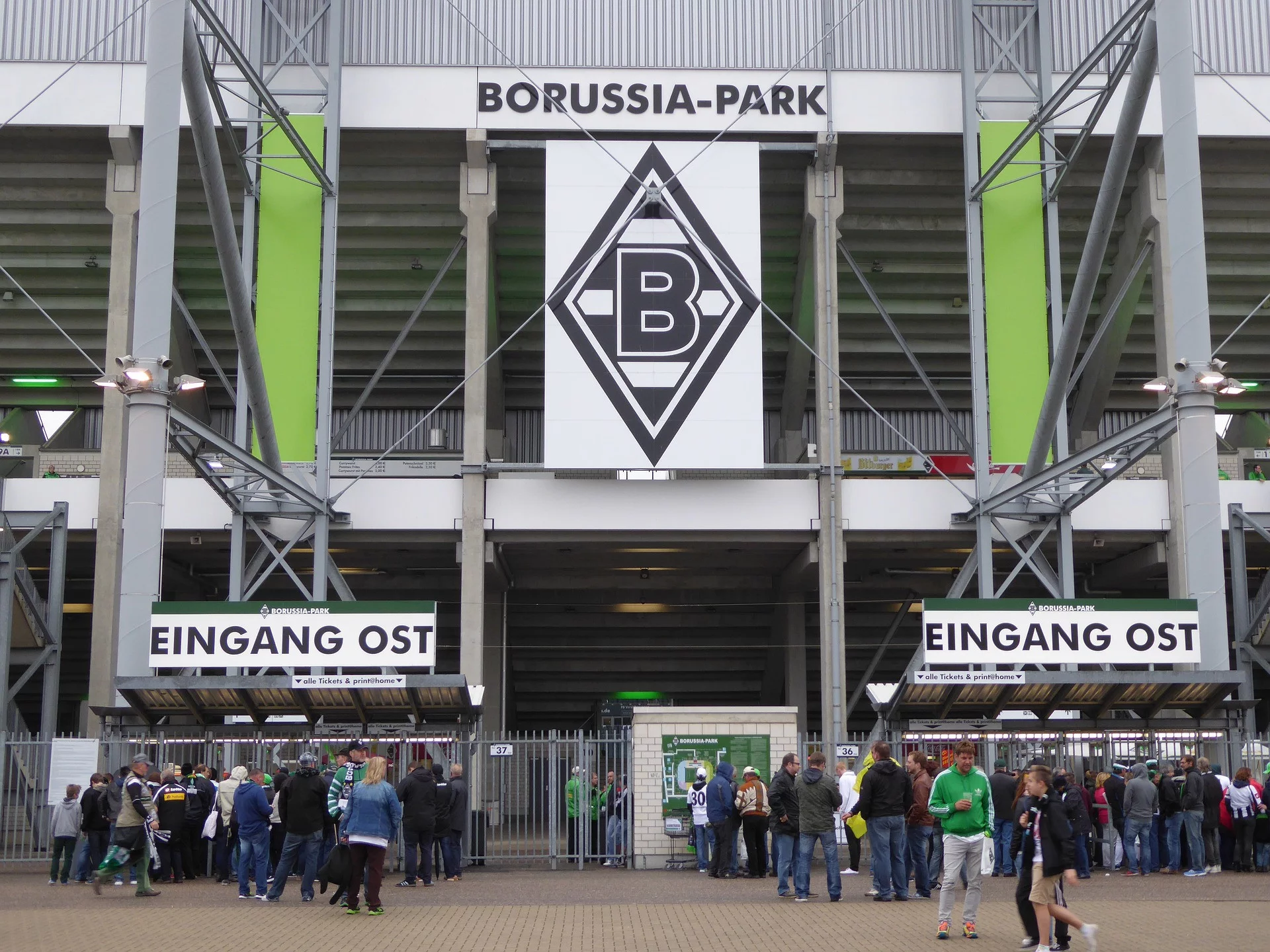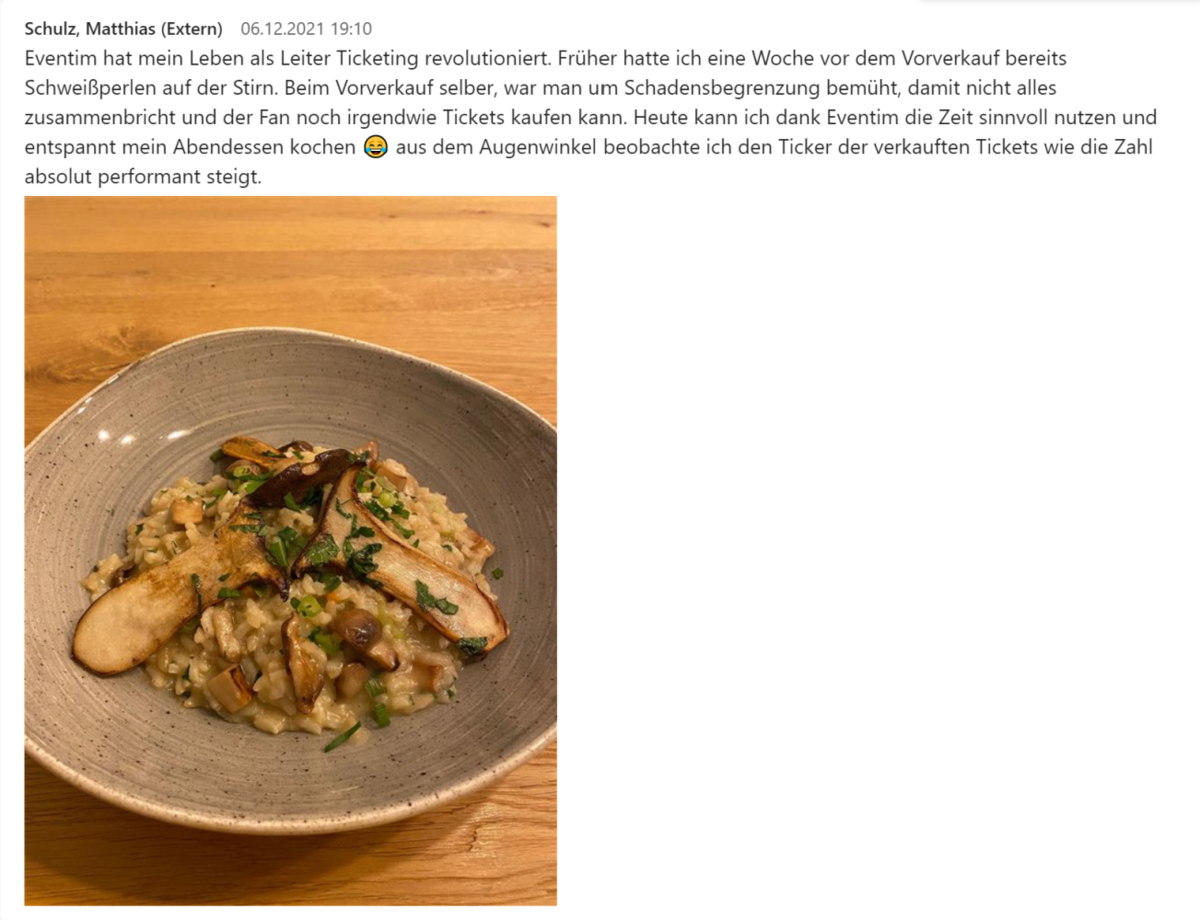
In dialogue with: Borussia Mönchengladbach (Part 1)
12 April 2022
Borussia Mönchengladbach has been using the SaaS solution EVENTIM.Tixx as its ticketing software for over a year now. Our two consultants Torsten and Saša, who are also the first points of contact for the club, spoke to their colleagues in Gladbach Matthias and Tim.
Saša Djordjevic: Matthias, you were already active in ice hockey before your station in Gladbach.
What are the biggest challenges or differences of a football club in the 1. Bundesliga compared to your previous stations with the DEG and the Krefeld Pinguinen?
Matthias Schulz: The differences are gigantic. When I started here at Borussia, I asked myself if I had really ever worked in ticketing. For comparison: In Düsseldorf there were twelve of us, in Krefeld six and in Gladbach we have 300 employees.
The other thing is the stadium issue. From 12,000 spectators in Düsseldorf, to 8,000 spectators in Krefeld and suddenly to 54,000 spectators in Gladbach. That's a different story in organisational terms. The attention behind it is also completely different. In ice hockey you open the advance sale sometime in the summer, there is no big hype. Everyone buys their 3-4 tickets spread over the season. There is no situation, however, with a pre-sale date when 100,000 people access the online shop. Moreover, there is no such thing as an away game in ice hockey.
Saša Djordjevic: I can imagine that.
What about the "struggle" of having to sell tickets? Football used to have a luxury problem where you had to look at who you let in in the first place. In ice hockey it has always been more of a challenge...
Matthias Schulz: That's right. In ice hockey it was a fight for every spectator. Especially if you play during the week at the beginning of the season, when people are still walking around in shorts and T-shirts. But it's the same in football. Borussia Mönchengladbach has a good turnout. But we weren't sold out for every game before the pandemic. You have to ask yourself whether you have to sell out every game or be satisfied when you have 40,000 spectators in the stadium on Tuesday night, just before Christmas.
Saša Djordjevic: Let's move on to you, Tim. You've been with Borussia a bit longer than Matthias and you've been involved in a lot of things in ticketing. In the past, ticketing was only ticket sales. Now it's much bigger.
What have been the biggest gamechangers in ticketing for you in recent years?
Tim Janssen: I don't think you can compare ticketing nowadays with the past. When I say in the past, you have to know that I've been working for Borussia for 22 years. That means I'm still a child of the Bökelberg. That is both a curse and a blessing. In my early days, people ordered tickets by fax. There was no online portal. You have to imagine that.
An anecdote: When we were promoted to the first division in 2001, the match schedule came unexpectedly. It was a Friday afternoon, you were looking forward to the weekend and suddenly the fixture list arrived by fax. Then the first home game was against FC Bayern. There was no official start of advance ticket sales. The only thing to do was to add paper to the fax as quickly as possible, because everyone ordered 1, 2, 3, 4 tickets. In the following weeks, letters arrived, some with cash or cheques. Unimaginable. You then sent the tickets to the people by post and made sure that they somehow got in on match day. The tickets were not scanned, but only torn off. Of course, this meant you didn't know how many people would ultimately be in the stadium.
If you project that into today's world, with online shops, secondary markets, mobile tickets and electronic access control, it's a completely different world. The biggest challenge is to always keep yourself up to date, but also to take the fans with you and not overwhelm them.
Another game changer is the security factor. The attack in Paris a few years ago was one of the triggers that presented us with completely new challenges. When it comes to security, it's no longer enough to check whether you have a valid ticket. You have over 50,000 fans that you have to get in and out of the stadium safely.
Saša Djordjevic: You have already reported that the technological requirements and expectations have changed a lot in recent years. We have been working together in the field of ticketing for almost a year now; before that, you worked with another provider for a long time.
Can you say what the motivation and trigger was to switch providers?
Tim Janssen: We realised that we had reached our limits with our provider at the time. For a long time we sat on a desert island where we only developed for ourselves. And we had to get away from that. We needed a partner who had competence, who gave us input, who had references and who would help us move forward in our networking, so that it was no longer a one-way street. On the way to deciding on a new ticketing service provider, we of course also talked to others, but quickly had to realise that if we make the change, it can only be with you. And we don't regret this decision for a second. In the beginning, we had to do a lot of convincing internally, which we did together with you, and in the meantime everyone in the company is very glad that we took this path last year.
What was the hardest thing you had to do? What were your biggest worries during the project?
Tim Janssen: Five to six years ago, we embarked on a path in which a lot was invested. It is difficult to admit to oneself that perhaps it was the wrong path and that one has to reinvent oneself in ticketing. This acknowledgement that we have to make changes again was certainly the most difficult thing.
Matthias Schulz: It has to be said that we reflected on ourselves very well. We looked at what we had at the time, what the prerequisites for the future were and what challenges we faced. In this analysis, we realised that we would have had a very hard time with the setup in ticketing at that time to even keep the day-to-day operations running in the future, let alone to be able to push ahead with any further development.
What has changed for you with the switch to EVENTIM Sports?
Matthias Schulz: I think the magic word behind it is: processes. The processes have changed - in the whole building. There are effects on accounting, on the service centre, on the fan shop, on the box office, etc. We come from a solution that was totally individualised. If you had an idea, you went to our software developers and told them "XY is what I want, when will it be ready?". Now, for many, a completely new process had to be set up, which certainly had to be established first. That's why it's necessary to keep your colleagues happy.
We knew what we were getting into. We knew that we were moving from "make a wish" to a large corporation with many customers where there is no longer "make a wish". Wishes that are expressed are also implemented, but of course that takes longer now. But the good thing is that you know that some things are no longer up to date. There are also things in your system that need to be tackled, that need to be revised, but there is also a constant development.
Tim Janssen: Processes are one thing, but of course we must not forget that we also benefit from people. When we are at our wits' end, we pick up the phone, call one of you and always get a competent answer. Be it at the weekend or late at night and that is of course extremely important. Our core business is at the weekend. We know we have expertise on your side and not only that, but also passion.
How are your software developers? What have you heard from them?
Tim Janssen: As far as our department is concerned, he is now sleeping peacefully. He has other things to do now, but they have relatively little to do with ticketing. I haven't received an email from him at 3 a.m. in a long time. That's a good sign.
Matthias Schulz: But that's also because he no longer has sleepless nights before the pre-sales.
Saša Djordjevic: But neither do you, you sent me a photo of your risotto while the pre-sale was starting.

Are there any things that you would highlight? Is there a button that you are particularly grateful for?
Matthias Schulz: Yes, the topic of corona measures is particularly important. We started our cooperation at a time when there were new measures every week. The topic of copying games, but also arena plan set-up, that has all become much easier. Or the topic of mass cancellations, a wonderful topic with us. That's why I think we've come through the pandemic extremely well so far from a ticketing point of view. And that we have gained a strong partner. It always sounds so stupid, but I remember the call with Saša late at night, before our Bayern pre-sale for the first game of the season. That's anything but self-evident, but if there hadn't been that call, we would have had a big problem the next day because we had forgotten to reserve 500 tickets.
Tim Janssen: The performance, you forget about that because it becomes self-evident so quickly. When I think back to the times when you sweated blood and water every time you went on pre-sale. Now you open the pre-sale and it's a reassuring feeling for us to know that it starts at 6 p.m. and then it's on at 6 p.m.. Likewise, it has become incredibly easy for the fan who wants to buy a ticket. That was a lot of pain that the fan had to endure, but also we had to endure. If the fan has been hanging on the F5 button for half the morning and never come to a sensible conclusion, it's a different world now. This ensures that the fan is extremely satisfied. They're not interested in what's behind it, they're interested in the fact that it works. They want their ticket or at least to be told quickly that they're going away empty-handed.
Matthias Schulz: The nice thing is that we just talked about how easy it is to criticise. After the first pre-sales with you guys, we really rubbed our eyes. People were praising us for ticket sales on the social media channels.
That's when our fans were sitting in front of their computers with 5 question marks, wondering, "How can this be that the whole buying process worked?"
And it's not just that fans feel an improvement. We also have to think about ourselves, how we work internally, how colleagues work, how everyone can work with the system. It's become much more convenient, easier and performant for us.
You can read how Matthias and Tim see the future of football and ticketing in the second part of our interview.